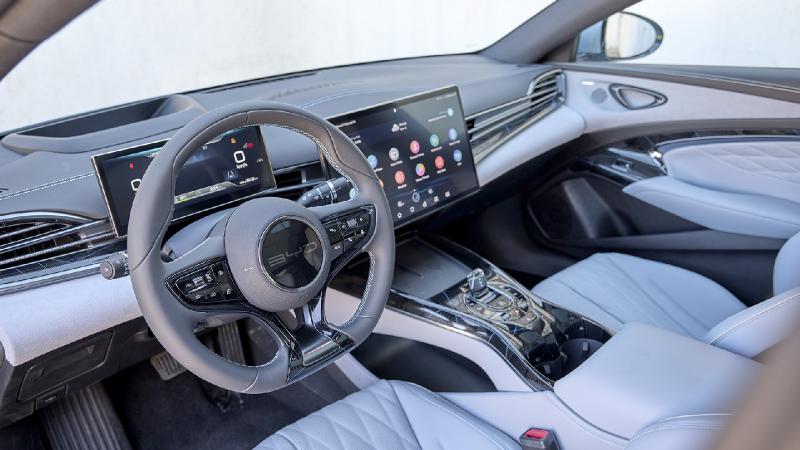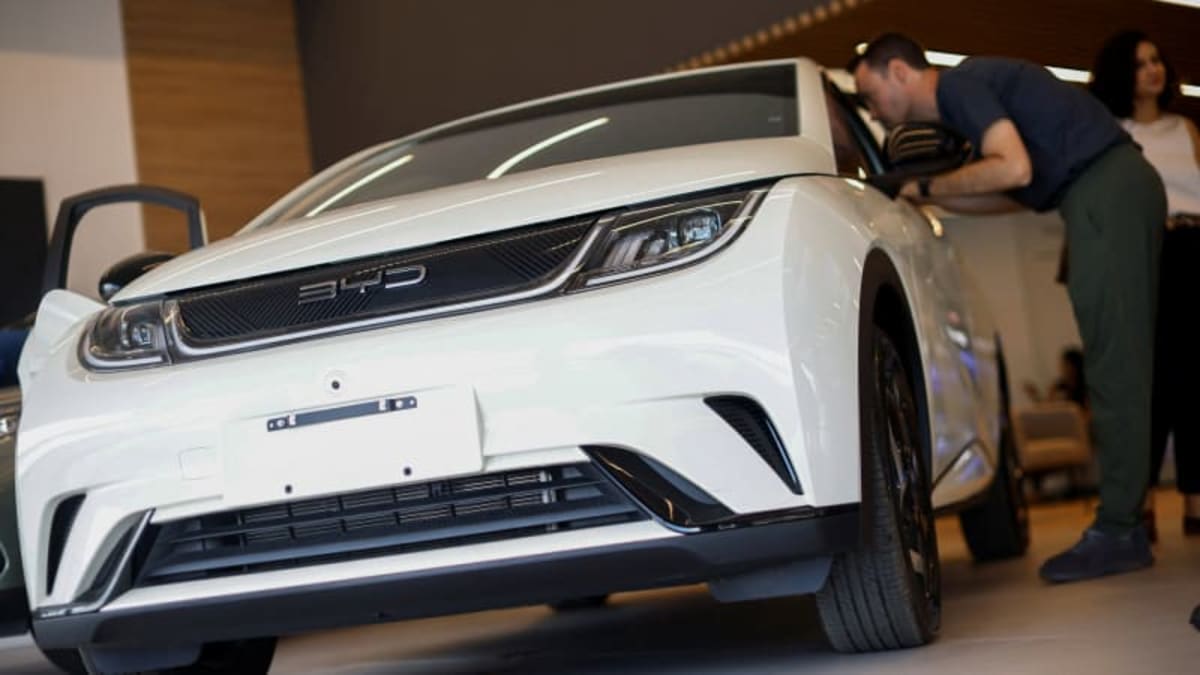Cheap Chinese cars from Mexico could be 'an extinction-level event,' U.S. trade group says
Category: Alternative Energy
Via: outis • last year • 25 commentsBy: Reuters / Autoblog Feb 23rd 2024 at 5:54PM (Autoblog)


A U.S. manufacturing trade group urged the Biden administration to block the import of low-cost Chinese automaker imports from Mexico that it says could threaten the viability of American car companies.

I've been a gearhead for over sixty years. When I was a kid, General Motors was by far the greatest industrial company in the world, controlling well over half of the American automobile market - the largest automobile market in the world. Over a couple decades, I watched in disbelief as GM ignored the HEADLINE writing on the wall: the Japaneses are coming! GM persisted in making mediocre badge-engineered cars.
Eventually, I realized that successive GM CEOs simply had no interest in rocking the boat. They took their enormous pay and benefits and retired. Now... the Chinese are coming.

BYD's plan for a factory there sets off alarms and a plea to block imports

WASHINGTON — A U.S. manufacturing trade group on Friday urged the Biden administration to take steps to block the import of low-cost Chinese automaker imports from Mexico that it says could threaten the viability of American car companies.
"The introduction of cheap Chinese autos — which are so inexpensive because they are backed with the power and funding of the Chinese government — to the American market could end up being an extinction-level event for the U.S. auto sector," the Alliance for American Manufacturing said in a report.
The group argues the United States should work to prevent automobiles and parts manufactured in Mexico by companies headquartered in China from benefiting from a North American free trade agreement. "The commercial backdoor left open to Chinese auto imports should be shut before it causes mass plant closures and job losses in the United States," the report said.
Vehicle and parts produced in Mexico can qualify for preferential treatment under the U.S.-Mexico-Canada trade agreement as well as qualifying for a $7,500 electric vehicle tax credit, the report noted.
The Chinese Embassy in Washington and the U.S. Trade Representative office did not immediately comment.
The issue has taken on new interest after news outlets reported that China's BYD plans to set up an electric vehicle factory in Mexico . BYD, known for its cheaper models and a more varied lineup, recently overtook Tesla to become the world's top EV maker in terms of sales.
Tesla itself announced plans almost a year ago to build a factory in Mexico, in the northern state of Nuevo Leon. In October, Mexico said a Chinese supplier for Tesla and a Chinese technology company would invest nearly a billion dollars in the state of Nuevo Leon.
A bipartisan group of U.S. lawmakers has urged the Biden administration to hike tariffs on Chinese-made vehicles and investigate ways to prevent Chinese companies from exporting to the United States from Mexico.
A group of lawmakers urged U.S. Trade Representative Katherine Tai to boost the current 27.5% tariff on Chinese vehicles and said USTR "must also be prepared to address the coming wave of (Chinese) vehicles that will be exported from our other trading partners, such as Mexico, as (Chinese) automakers look to strategically establish operations outside of (China)."
Alliance for Automotive Innovation CEO John Bozzella has said that proposed U.S. environmental regulations could let China gain "a stronger foothold in America’s electric vehicle battery supply chain and eventually our automotive market."
The U.S. Treasury issued guidelines in December on the $7,500 EV tax credit aimed at weaning the U.S. electric vehicle supply chain away from China.

Tags
Who is online
42 visitors

I have no personal stake in GM... or any other American company for that matter. So I really shouldn't care if the mostly-wealthy stockholders of General Motors take another beating because of corporate bullheadedness.
Then again, stupidity annoys me. Greed annoys me. Lack of foresight annoys me.
Oh, and... the other automakers are behaving just like GM. Perhaps the most egregious is Stellantis, which markets several very nice cars is Europe... but doesn't bring them to America.
Well, you know, EV manufacturing in the US really has been subsidized by the Federal government. That raises a serious question. Why do Chinese subsidies lower the prices of manufactured goods while US subsidies raise prices on those same manufactured goods?
US car manufacturers produce components and cars in Mexico, too. Yet those US businesses can't even compete with free US government money backing them up? So, why is China the problem here?
Big Oil is the most heavily subsidized industry in world history. Relatively, the subsidies for EVs are peanuts.
“ During FY 2016–22, nearly half (46%) of federal energy subsidies were associated with renewable energy , and 35% were associated with energy end uses. Federal support for renewable energy of all types more than doubled, from $7.4 billion in FY 2016 to $15.6 billion in FY 2022.”
https://www.eia.gov/analysis/requests/subsidy/#:~:text=During%20FY%202016–22%2C%20nearly,%2415.6%20billion%20in%20FY%202022.
Seems like US auto manufactures competing on the basis of affordability, lower operating cost, and increased energy efficiency might address that issue. But, no, US manufacturers are more worried about stockholder value (which means management lining its own pockets, they are the stockholders of concern).
Volkswagen was able to produce a ICE vehicle that achieved a fuel efficiency of 56 mpg. Volkswagen was whacked for cheating on pollution controls. And we're supposed to believe that a vehicle which burns five times more fuel to go the same distance is cleaner. There are a significant number of energy efficient ICE vehicles that have been banned from import into the US to satisfy the same idiotic criteria. EPA pollution controls were a subsidy for Bid Oil, too. Thank you, Greenpeace, you've been good for the bottom line. Would there have been a climate crisis without the Clean Air Act bureaucracy?
The Federal government installing EV chargers is a subsidy for auto manufacturers. Federal subsidized wind and solar farms provide a subsidy for auto manufacturers, too. And Federal transportation spending subsidizes both EVs and Big Oil. And yet we never seem to consider efficiency, sustainability, resilience, or competitiveness whenever some environmental nerd has a wild hair growing out their ass. That's how a vehicle that burns five times more fuel can be applauded as being cleaner.
If "nearly half" went to renewable energy, that would leave "more than half" for non-renewable energy, wouldn't it?
The federal government subsidizes oil exploration, extraction, and refinement. It allows amortizing at huge rates.
Big Oil gets money from so many different government sources that it's very hard to estimate the total.
No, if you read the report you will find:
“During FY 2016–22, most federal subsidies were for renewable energy producers (primarily biofuels, wind, and solar), low-income households, and energy-efficiency improvements.”
The referenced 35% to energy end users were to producers and consumers of renewable energy.
So, the reason US auto manufacturers couldn't compete with Japan in the 1970s and compete with China today is because of Big Oil? That seems a little more than just far-fetched.
The point is that the Federal government has been directly subsidizing EV manufacturing. (I don't recall the Federal government directly subsidizing ICE cars.) The US EV manufacturers are wanting to ban free trade in EV automobiles because China subsidizes manufacture just as the Federal government has been doing. The tired old neoliberal argument about Chinese subsidies won't work this time because the US is doing the same thing China does. Trade restrictions on EVs have already prohibited the import of a number of affordable EVs available in other countries.
So, why does Chinese subsidies result in cheaper EVs while US subsidies result in more expensive EVs? The Chinese subsidized EVs are price competitive with ICE cars. US subsidized EVs are considerably more expensive than ICE cars. What exactly is all the Federal money buying?
I didn't say that. Big Oil's subsidies is a different story.
I said US auto manufacturers then and now are shortsighted because that's in their CEOs' interest. "Don’t rock the boat, take a gargantuan pay package, and retire."
Americans want big vehicles, so the government has fuel economy rules and crash safety rules that favor big vehicles, and American manufacturers supply BIG vehicles.
This is foolish and shortsighted... but that's kinda how Americans function. Pleasure now, and worry about tomorrow sometime next week.
And not part of the seeded article being discussed. Big Oil has become nothing more than a go to excuse to change the subject, especially among enviro groups. As a general rule, environmentalists are motivated by politics and money. Giving EPA any sort of choice will typically result in an outcome that is the least sustainable, lacks resilience, and shoves whatever problem is being addressed off onto our 'trading partners'. Yes, EPA really does consider free trade an environmental policy. It's NIMBY policy that merely kicks the can but, nevertheless, EPA prides itself on making the US cleaner by creating environmental problems elsewhere around the world.
(None of this was part of the seeded article being discussed, either. The article is focusing attention on economic issues and not environmental issues.)
Agreed. As I have said earlier in the discussion. Chinese business management seems less concerned with protecting short term profit. US business management seems to be considerably more short sighting; managing their businesses on a quarter basis.
That is a market factor assumption that is not universal. Honda, Toyota, NIssan, Kia, Lexus, Volkswagen, and few others are profiting from the US market without big vehicles in their market offerings. Reviewing news footage of natural disasters, particularly floods, doesn't suggest that BIG vehicles is the norm. It is Ford, GM, and what used to be Dodge who only want to sell big vehicles because they're more profitable vehicles. Again that's driven by supply-side economic factions and not by the market, the environment, or by technological progress.
American consumers are still motivated by affordability, performance, reliability, and, in many cases, features. A lot of the BIG pickups and SUVs on the road are appealing because they seem to be safer in a crash. That's driven more by anecdotal evidence that BIG government, the auto industry, banking, and supply-side politicians (and, yes, environmental activists) refuse to dispel, for obvious reasons. The one and only motivation for supply-side regulation and control of society is money. Money is why the myth of the BIG vehicle persists.
I clearly remember the wave of Japanese cars hitting the US and the Big Three still producing gas guzzlers pieces of crap
Ford has cut out building any sedans except for the Mustang and are concentrating on the SUV and truck market I believe that GM is doing the same. Short term profit and long term diaster, IMO.
The price wars in the EV market have taken a toll on profits. I found this article that is interesting.
BYD earnings have been booming, but faced some headwinds in Q4 amid significant discounting . On Jan. 29, BYD reported preliminary 2023 net income of RMB 29 billion ($4 billion) to RMB 31 billion. That's up 74.5%-86.5% vs. 5
https://www.investors.com/news/tesla-vs-byd-2024-tsla-stock-ev-rivals/#:~:text=BYD%20earnings%20have%20been%20booming,up%2074.5%25%2D86.5%25%20vs.
Exactly.
I read Chevy will build a next generation Malibu...
My dad bought a used Toyota Land Cruiser in 1969 and a new Datsun 510 in 1970. While he owned some US made cars since, I’ve only owned a Honda Accord assembled in Ohio and an C-RV assembled in Indiana all of my other cars were designed and assembled outside the states.
I drove mostly GM cars for years until I drove a Toyota Camry and discovered that it was the smoothest, quietest, good on gas car I ever had, and Toyota Camrys are what I drove from then on. This was the last car I had before I left Canada.
But as smooth and quiet as that car was, it was totally eclipsed by the Chinese EV I had a ride in here about a few months ago.
Did you find one in those weed infested lots described in 4.1 ?
LOL. No, I don't drive here. The fairly new car I was in was owned and driven by the son of one of my wife's old friends.
Seems to me Biden is between a rock and a hard place when it comes to dealing with this problem. He has the multimillion-dollar yearly salaried corporate bosses and their shareholders on one hand to not anger, because maybe the bosses might be forced to settle with only a million dollars a year instead of multiple millions, and the millions of consumers who end up paying an awful lot more for products they need than they really should have to.
Biden should let us buy those cheap subsidized cars.
China’s Abandoned, Obsolete Electric Cars Are Piling Up in Cities
A subsidy-fueled boom helped build China into an electric-car giant but left weed-infested lots across the nation brimming with unwanted battery-powered vehicles.
Why write about abandoned electric cars in particular? How many zillions of abandoned ICE cars are strewn across America? How many breaker's yards?
This is clickbait "journalism", pulling in readers who want to read about how horrible progress is.
AND OF COURSE, how horrible China is.
Well of course
Bloomberg and it's reactionary, yellow journalism is known for that.
Who said horrible? Was the Bloomberg article inaccurate? Aren't they a left leaning media?